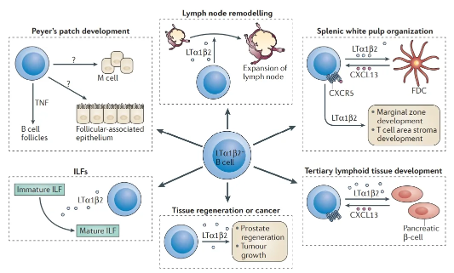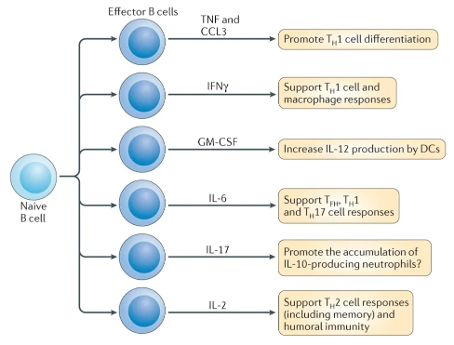Cytokines
November 7, 2024
Source: drugdu
 235
235
Preface
B cells are the only cell type capable of differentiating into antibody secreting cells (plasma cells), and they can also present antigens to T cells and produce cytokines. By producing cytokines, B cells affect multiple aspects of immunity: cytokines derived from B cells, including lymphotoxins, are crucial for the individual development, homeostasis, and activation of secondary lymphoid organs, as well as the development of tertiary lymphoid tissue in ectopic sites; Other cytokines derived from B cells, such as interleukin-6 (IL-6), interferon - γ, and tumor necrosis factor, can affect the development of effector cells and memory CD4+T cell responses; Finally, B cells can regulate inflammatory immune responses by secreting IL-10 and IL-35, and "regulatory B cells" are the main source of inhibitory cytokines derived from these B cells in the body.
The role of B cells in tissue development and repair
Lymphatic organogenesis is mainly regulated by lymphoid tissue induced cells (LTi), however, B cells are also crucial for the generation of secondary lymphoid tissue and the remodeling of these tissues after immune activation. The role of B cells in lymphoid organogenesis depends on the lymphotoxin alpha 1 β 2 they provide. During development, B cells are the first lymphocytes to be inoculated into the spleen. Here, they provide the necessary LT α 1 β 2 and tumor necrosis factor (TNF) for the development of follicular dendritic cells (FDCs); The LT α 1 β 2 derived from B cells also contributes to the development of T cell matrix and splenic margin. In addition, B cells also contribute to the maturation of intestinal associated lymphoid tissues, including Peyer's patches and isolated lymphoid follicles (ILFs). Unlike the spleen, the development of FDCs in lymph nodes and Peyer's patches requires B cells to express TNF, rather than LT α 1 β 2.
During development, B cells are the first lymphocytes to be inoculated into the spleen. Here, they provide the necessary LT α 1 β 2 and tumor necrosis factor (TNF) for the development of follicular dendritic cells (FDCs); The LT α 1 β 2 derived from B cells also contributes to the development of T cell matrix and splenic margin. In addition, B cells also contribute to the maturation of intestinal associated lymphoid tissues, including Peyer's patches and isolated lymphoid follicles (ILFs). Unlike the spleen, the development of FDCs in lymph nodes and Peyer's patches requires B cells to express TNF, rather than LT α 1 β 2.
Immune response can lead to the formation of tertiary lymphoid tissue in ectopic sites, and the formation of these structures depends on B cells and LT α 1 β 2. For example, even in the absence of inflammation, transgenic expression of Cxcl13 in pancreatic beta cells is sufficient to induce local formation of lymphoid structures with ordered B and T cell regions. This indicates that the localization of B cells expressing LT α 1 β 2 in ectopic sites is sufficient to trigger the development of tertiary lymphoid structures.
In mice, prostatectomy can induce regeneration of the organ through testosterone administration. It is worth noting that the regeneration process is related to the infiltration of B cells, which play a crucial role in regeneration by providing LT α 1 β 2. In addition, B cells also promote the recurrence of prostate cancer in mice: tumor resection leads to a large number of cancer cell deaths, while B cells infiltrate the prostate. The infiltrated B cells stimulate tumor regrowth by providing LT α 1 β 2, and B cell deficiency is associated with delayed recurrence.
B cells in effector CD4+T cell response
The cytokines produced by B cells not only promote the development and remodeling of lymphoid tissue that produces adaptive immune responses, but also actively affect effector and memory CD4+T cell responses. Immature B cells can develop into different subpopulations of cytokines that affect CD4+T cell responses. Various subpopulations of B cells that produce cytokines have been identified, which regulate the polarization of CD4+T cell responses in the body. For example, Toxoplasma gondii infection induces B cells expressing TNF and CC chemokine ligand 3 (CCL3), promoting TH1 cell differentiation; In the Salmonella enterica infection model, TH1 cells and macrophages can also be activated by B cells that produce IFN - γ; In atherosclerotic mice and mice with pulmonary infection or sepsis, some B cells differentiate into antibody secreting cells (ASCs) that secrete granulocyte macrophage colony stimulating factor (GM-CSF). The production of GM-CSF by B cells can increase the production of IL-12 by dendritic cells (DC); In addition, IL-6 producing B cells were observed in experimental autoimmune encephalomyelitis (EAE), which promoted the differentiation of TH1 and TH17 cells; Finally, IL-2 derived from B cells may play multiple roles in the formation of memory T cells during H. polygarus infection.
Immature B cells can develop into different subpopulations of cytokines that affect CD4+T cell responses. Various subpopulations of B cells that produce cytokines have been identified, which regulate the polarization of CD4+T cell responses in the body. For example, Toxoplasma gondii infection induces B cells expressing TNF and CC chemokine ligand 3 (CCL3), promoting TH1 cell differentiation; In the Salmonella enterica infection model, TH1 cells and macrophages can also be activated by B cells that produce IFN - γ; In atherosclerotic mice and mice with pulmonary infection or sepsis, some B cells differentiate into antibody secreting cells (ASCs) that secrete granulocyte macrophage colony stimulating factor (GM-CSF). The production of GM-CSF by B cells can increase the production of IL-12 by dendritic cells (DC); In addition, IL-6 producing B cells were observed in experimental autoimmune encephalomyelitis (EAE), which promoted the differentiation of TH1 and TH17 cells; Finally, IL-2 derived from B cells may play multiple roles in the formation of memory T cells during H. polygarus infection.
Overall, cytokines produced by B cells almost affect various aspects of T cell responses, from polarization of TH cell subpopulations to formation of memory cells.
The role of B cells in immune negative regulation
B cells can negatively regulate immunity by producing IL-10 or IL-35 in various diseases, including TH1 or TH17 cell-mediated autoimmune diseases (such as EAE), TH2 cell-mediated diseases (such as ulcerative colitis and allergic airway inflammation), systemic autoimmune diseases (such as systemic lupus erythematosus), and bacterial infections (such as Salmonella typhimurium or Listeria monocytogenes). For example, in autoimmune pathology mediated by TH1 or TH17 cells, CD1dhi B cells can produce IL-10 when activated in vitro and protect mice from EAE in an IL-10-dependent manner after adoptive transfer. In addition to the production of IL-10, BCR and CD40 signaling jointly stimulate immature B cells to express a unique inhibitory cytokine IL-35, which is a heterodimeric cytokine of the IL-12 family. The production of IL-35 is usually associated with immune suppression.
For example, in autoimmune pathology mediated by TH1 or TH17 cells, CD1dhi B cells can produce IL-10 when activated in vitro and protect mice from EAE in an IL-10-dependent manner after adoptive transfer. In addition to the production of IL-10, BCR and CD40 signaling jointly stimulate immature B cells to express a unique inhibitory cytokine IL-35, which is a heterodimeric cytokine of the IL-12 family. The production of IL-35 is usually associated with immune suppression.
Summary
B cells have multiple functions in immune response. The research results indicate that B cells can not only differentiate into antibody secreting cells, but also regulate the development of lymphoid tissue, T cell response, and immune response by producing cytokines. B cells that produce cytokines play an important role in human diseases, for example, B cells in multiple sclerosis patients show IL-10 secretion deficiency and produce more pro-inflammatory cytokines such as IL-6, TNF, and lymphotoxins. Therefore, a deeper understanding of the role of B cells in the immune system and further elucidation of the mechanism by which B cells produce cytokines will help us develop methods targeting B cells for the treatment of autoimmune and inflammatory diseases.
Furthermore, little is known about the role of B cells, which produce cytokines, in human infectious diseases. Studies on mice have shown that B cells that produce cytokines play an important role in the formation of memory T cells and in promoting the efficacy of certain vaccines. These data indicate that this may be an effective research area for developing new human vaccines.
Read more on
- Gan & Lee Pharmaceuticals’ new PROTAC drug GLR2037 tablets have been approved for clinical trials to enter the field of prostate cancer treatment March 3, 2026
- AideaPharmaceuticals plans to raise no more than 1.277 billion yuan through a private placement to focus on the global clinical development of innovative HIV drugs March 3, 2026
- Giant Exits! Its Star Business Acquired March 3, 2026
- Focusing on cardiovascular and cerebrovascular diseases! OpenMediLead Medical Intelligence Dual Engines Launch Internal Testing, Connecting Drug Development and Clinical Diagnosis in a Closed Loop March 3, 2026
- Innovent Biologics Announces Approval of New Indication for BTK Inhibitor “Pitubrutinib” in China March 3, 2026
your submission has already been received.
OK
Subscribe
Please enter a valid Email address!
Submit
The most relevant industry news & insight will be sent to you every two weeks.



